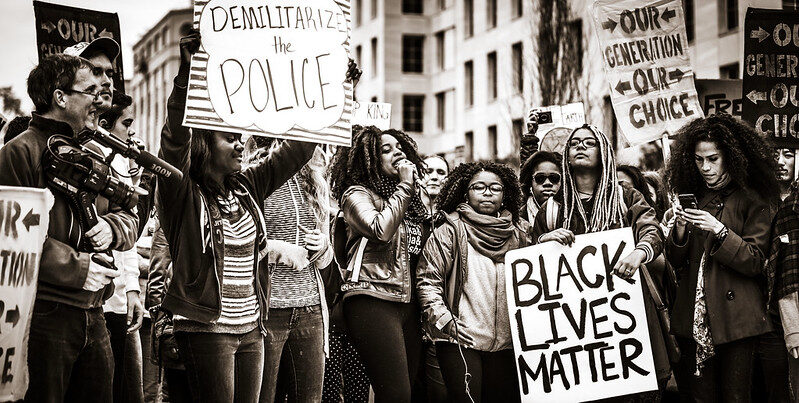
The #blacklivesmatter movement has (I hope) got us all thinking about how to be anti-racist – how to be part of the solution not part of the problem.
However, I think we are going to find that being anti-racist is much broader than simply anti-black-and-brown-people racism – being anti-racist means being anti-oppression, and in this short post I’m going to try to explain why I think we classroom teachers (I talk in particular about language teaching because that’s my profession, but my point applies to all teaching) have some learning to do. Let me start with something surprising:
As language teachers:
- I don’t think we should be telling our students HOW to speak – I don’t think we should be judging THEIR utterances by OUR “native-speaker” standards. We should be helping them develop ideas about THEIR OWN standards, and helping them work towards THOSE standards, not our own.
- And I don’t think we should be telling them WHAT to say – I think we should be helping them to find THEIR OWN voices, to say what THEY want to say, not what WE want them to say.
Yes, as educators we have a role: we can suggest topics and roads of enquiry, and prod them with questions to encourage deeper thought.
IF that’s what they want.
And indeed, to help them towards more “native-speaker” norms.
IF that’s what they want.
Or towards greater clarity and intelligibility.
IF that’s what they want.
And if that’s NOT what they want, then we should help them with the things they DO want.
And yes, ultimately “learning English” might actually NOT be what they want – it is our obligation to support them in that too.
Because teaching is not, or at least should not be, “making people learn”.
Making people do things is oppression.
Teaching is (or should be, in a fair and just world) HELPING people learn.
Yes, it’s a wild wild world out there and we want to help our students get ready for it. But we fail to do that when we start with oppression.
About a million years ago now I (briefly) dated a Swiss girl who proudly said “jaa” where a native-English speaker would likely say “yes” – her reasoning was simple: “because I am Swiss”. Who is anyone to tell her she shouldn’t?
Likewise I now publish YouTube videos in accented non-native-speaker Japanese – and yet I expect (nay, demand) that people listen to WHAT I have to say, not nitpick HOW I say it.
(As it happens I’m actually very keen to move towards more “native” Japanese standards, so I DO welcome tactful pointers, but that’s MY choice, not someone else’s).
We’ve all been watching the news of the #blacklivesmatter movement, and I am sure (or at least am hoping) that we are all keen to support it.
However I believe that supporting it is going to be more challenging for us than we currently realize.
I believe that the issue reaches out far beyond “anti-black-and-brown” racism, to all forms of oppression (= imposing our will on others). I believe that as teachers we work in educational systems that are historically based in oppression (compulsory schooling was instigated at the time of the industrial revolution to further its ends) and that all too often we continue to oppress even as we think we are helping.
A couple of examples:
- we all give grades against standards that we (or our educational institutions, or our governments) decide on.
- we all correct our students’ utterances without asking them if they want to be corrected according to our “native” standards.
I would like to invite you to consider: why are the students not involved in shaping those standards? It is after all THEIR learning, not ours…
My broader point is that I believe that being anti-racist REQUIRES us to be anti-oppression, and that REQUIRES us re-examine how we teach, at a fundamental level. Which, for many of us, is likely to to be a little more challenging than we realize.
Because it is challenging (in ways some of us might be tempted to shy away from) I would like to gently prod you to move in this new direction with both an encouragement and a warning:
- I’ll encourage you by saying we can all learn new skills and ways of being with our students – rejecting oppression doesn’t mean throwing out everything we have learned in our decades in the classroom, it means building on it, adding to it.
- And I’ll warn you by saying “change is coming – whether you like it or not”. Grow or die. We teachers are at some point going to be faced with students who will vote with their feet, declining to attend classes that they do not feel they gain value from. And more power to them – I celebrate their empowerment, and can do nothing more than hope they will find something of value in me – if not, I’ll be looking for a new way to make a living….
Let’s all be ready for this change.
I very much hope this post can help start a conversation that can help shape how we teach in ways appropriate for, and that help bring about, a fair and just world (that I hope and pray is currently birthing….)
